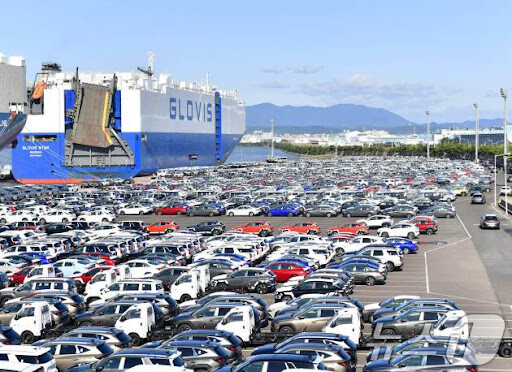
Seoul - The South Korean auto industry is on high alert after former US President Donald Trump mentioned a 25% tariff on imported cars. This is more than double the 10% tariff that industry experts had predicted, causing concern among Korean automakers.
"A 25% tariff is significant," said Kim Kyung-yoo, a senior research fellow at the Industrial Research Institute. "If this becomes a reality, there aren't many ways to respond."
An industry insider also expressed concerns about the impact on domestic production. "Since more than half of the cars produced in Korea are exported to the US, our price competitiveness will be greatly reduced," they said. "The domestic factories are already operating at low capacity, and this will make things even more difficult."
The industry is worried that a 25% tariff could lead to a decline in exports, similar to the impact of the 25% tariff on pickup trucks under the US-Korea Free Trade Agreement (FTA). Last year, there were no Korean-made internal combustion engine pickup trucks exported to the US, according to the Korea Automobile & Mobility Association (KAMA).
If the 25% tariff on cars becomes a reality, it will create a significant competitive disadvantage for countries that do not have a tariff exemption with the US. This is particularly concerning for South Korea, which relies heavily on car exports to the US.
In 2024, automobiles were South Korea's top export item to the US, with exports totaling $34.744 billion, accounting for 49.1% of total auto exports. Last year, Hyundai and Kia exported approximately 970,000 and 410,000 units to the US, respectively.
The IBK Industrial Bank Economic Research Institute recently predicted that a 25% tariff on automobiles could reduce South Korea's car exports to the US by 18.59% this year.
Citibank also analyzed that imposing a 25% tariff on Korean cars, parts, pharmaceuticals, and semiconductors could reduce South Korea's GDP by 0.203%.
While South Korea has been exporting cars to the US duty-free under the FTA, Trump has stated that he will not make exceptions for allies or FTA partners.
"Trump's strategy is to start with a high number and then negotiate," said an industry source. "However, unlike during Trump's first term, there is a lack of leadership in the Korean government this year, and there are not many cards to play in negotiations."
While Hyundai Motor Group can offset some of the damage through local production, there are concerns that parts manufacturers and smaller automakers will not have adequate countermeasures.
There are concerns that Korea GM, which relies heavily on US exports, may face an existential crisis.
"Korea GM is essentially a factory that exists for the US, exporting more than 90% of its production to the US," said Kim Pil-soo, a professor at Daelim University. "They may have to withdraw immediately."
Kim Kyung-yoo also expressed concerns, saying, "Hyundai Motor Group can make up for some of the export decline by increasing the operating rate of its US plant, but I don't know if parts manufacturers and Korea GM will be able to cope. When looking at the industry as a whole, exports are simply declining."
A Korea GM official said, "We are closely monitoring the current situation."
[Copyright (c) Global Economic Times. All Rights Reserved.]






























